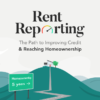Owning vs. renting. Renting vs. owning. The age-old debate goes round and round, as your head spins from each side’s argument. The truth of the matter is, this is a question only you can answer because the reality is, what makes the most sense depends on YOU.
Let’s break down some of what you may hear when it comes to this topic – and get straight to the facts about renting vs. owning.
Renting vs. Owning
Financially, owning a home is typically better in the long run. But, this comes with a big IF. Owning a home is financially beneficial IF you are ready.
Let’s say you have saved up a 10% down payment and found your dream home. You qualify for a loan, but you don’t have savings and it will take everything you have to close. Just because you CAN buy the house, doesn’t mean it will be financially beneficial to do so. With just one simple hiccup, you could be facing a crisis and with no savings, missing a few payments could lead to foreclosure. Before you know it, you’ve lost your dream home – even though you kept hearing it was a wise financial decision to buy it! Obviously, this is an extreme example we hope you never go through, but it’s a scary scenario that does happen!
On the other hand, let’s say you have your down payment, a high credit score to back it up and you’ve set aside an emergency fund that you’ll have after you close. When that hiccup happens, you cover it with your savings and then go back to normal, never missing a payment or even experiencing much stress. If this is you, you may be ready to buy!
The benefits of homeownership
When weighing renting vs. owning, the first thing most people look at is a monthly rent payment vs. a monthly mortgage payment. Let’s start by looking at mortgage payments.
Fixed monthly payments
Assuming you sign up for a fixed rate mortgage, you can relax knowing that for the next 15 or 30 years, your monthly payment won’t change. Compare that with renting and the reality that every time you renew your lease your landlord might decide it’s time to increase your contract!
If you start with a $1,000 rent payment and it increases $100 a year, just ten years from now you’ll be paying $2,000, or double what you originally started with! That’s a great case for owning when looking at renting vs. owning – but it’s not the only thing to consider.
One thing to note here is that your monthly mortgage payment is guaranteed, but the amount you add to that for escrow (to cover things like insurance and taxes) may change over time.
Equity

When you own a home, you start to build equity (or value) in it. Each time you make a payment, a portion goes to what’s called the principal, or the amount you agreed to buy your home for. As you make more and more payments, you pay down more principal. And instead of owing the full amount you paid for your home, say $200,000, you may only owe $150,000 now. That difference of $50,000 is your equity.
You don’t get this equity when you’re renting because you’re paying for the right to live there, but the landlord is actually the one holding the asset. Equity is important because you can use it down the road by borrowing against it or by getting it out when you sell.
Borrowing against your equity simply means you get the opportunity to borrow the amount – or some portion of the amount – of equity you’ve accumulated. You can do this by refinancing or taking a second loan against your home. If your goal is to pay down your home, you wouldn’t want to borrow again as soon as you make progress. But it can be a great option for emergencies or even to add an addition or improvements that may further increase your home’s value.
When you sell the home, you get all your equity out at closing. If you’ve paid down $50,00 and your home has increased in value $25,000 by the time you go to sell, you could end up with $75,000 in your account. That could be a down payment on your next house, or a pretty sweet vacation in the Bahamas!
Appreciation
Appreciation is another way of describing equity but it’s not the kind that comes from making your payments. Like we discussed above, your home value will likely increase over time. The longer you stay in the property, the more likely your asset has gone up in value. This is one of the main benefits many argue for owning versus renting.
Appreciation is simply an increase in market value over time – or from a jump in the economy. Just like equity, you can capitalize on appreciation through refinancing and through selling your home. You only have to pay off what you owe to the bank for your original purchase and anything above that goes into your pocket!
Tax benefits
No one likes paying more taxes than they have to and one benefit of home ownership is a couple of words everyone likes to hear – tax write-off. Each year that you own your home, you’ll be able to write off a portion of interest and taxes. Your mortgage lender will send you a statement of what you’ve paid over the year and when you report it, it will help your bottom line with the IRS.
You don’t get this benefit when you rent, but that’s because it’s not money you’re paying. The landlord is responsible to pay taxes and interest on that home or apartment you’re renting so you’re not getting the deduction but you’re saving from that perspective too.
Customize your space

There’s nothing more frustrating than moving into a great new apartment only to find out “sterile white” is the one paint color allowed. Landlords will always have rules to protect their property – understandable of course – but these disappear when you become an owner. While you still may answer to a home owner’s association or the nosey neighbor across the street, there’s a lot of freedom in knowing you can design your space the way you want to live!
Ready to rescue a pup from the shelter? You can! Of course, that means it’s up to you to repair any baseboards he eats!
The downsides of homeownership
Comparing renting vs. owning often leaves out the downsides of homeownership – and there are, in fact, a few. However, some people might also count these as positives – it really depends on how you look at them. Let’s take a look at some of them below.
Large upfront costs
Down payments, closing costs, and mortgage payments – oh my! It can get pricey fast. For a $200,000 home, a down payment of 20% is $40,000. That’s significantly more than a new lease might be, even if the landlord requires a deposit of first and last month’s rent.
It’s not just the initial payment either, you have to be comfortable knowing that your money is now gone – or at least not easily accessible. Unlike a security deposit you can get back in twelve months, you’ve invested in your home and likely won’t see that money again until you sell it!
Time investment
Buying a home is not for the faint of heart. You’ll likely take a few weeks to locate a realtor and begin the process of looking at properties. Expect your nights and weekends to be tied up for a while as you find your dream place and put offers in – some of which may get rejected.
Once you’ve signed a contract, you’ll be needed for at least a month if not longer, to supply old W-2’s, bank statements, loan notes, employment verification and more. The process is a lot harder than signing a lease and it can feel more invasive at times. If you’re not able to invest some time in your purchase, it may be better to rent another year and make sure your lifestyle supports this major decision.
Long term commitment

A house is a place to put roots down, so if you’re a free spirit who likes to move every year, it may not be the right time for you. Buying a home is expensive, takes time and can be a great investment in your future. But it’s not smart if you don’t plan to live there at least a few years.
Here’s an example of why – let’s say your closing costs were $10,000 and your home appreciates at $1,000 per year. If you sell your home after you’ve lived there a year, you’d be losing $9,000 – less any payments you’ve made towards principal – which isn’t much early on. Add in the costs of a realtor to help you with the sale and you could be losing thousands of dollars simply because you changed your mind.
Additionally, home sales don’t happen fast, even in the best of circumstances. From finding a realtor to putting it on the market, to finding a buyer and closing. Even if you decide to rent it out, you’d be dealing with finding a renter, signing contracts and ensuring you have the tools to manage as a landlord.
If you’re in a hurry to move, buying a home is not the best bet for you.
Since we’ve talked through ownership extensively, it’s time to give renting it’s due. Here are a few benefits to consider if you’re not feeling home ownership just yet.
The benefits of renting
Believe it or not, renting does have benefits over owning. It’s usually much more simple and flexible, not to mention it comes with much less paperwork and legal commitments.
No Title or Deed
You don’t have to worry about legally transferring the property when you rent. In fact, there’s not much to worry about at all. You simply find a property or apartment you like and sign a lease with the landlord. Outside of some simple terms you’ll need to agree to, in most cases, you can be in a new space in a day or two!
No HOA fees or assessments
As a homeowner, you may be faced with fees outside of your control. Like home owner’s association or assessments that apply to your area. HOA dues don’t typically go down because costs go up over time, but when you rent you don’t have to worry! Even if you are renting a home, the owner typically includes these in the rent price so if they go up, your lease contract stays the same.
A lease is all you need
When you rent, you don’t have to worry about mountains of paperwork to be signed. A lease is really all you need. If you sign a lease with an option to renew, you can be in your new place with a couple of signatures – and stay there for as long as your lease allows. It’s a big difference from the home buying process, and can make your next move much easier.
Of course, as we discussed – remember there are downsides you need to consider. Your rent will likely increase every year and you’ll be limited on what you can customize. You also won’t gain that great equity so weigh your options as you take your next step.
So, what if you have decided it’s time to buy but you aren’t quite ready? Should you consider rent to own options? You can learn more about these here, but in summary, we don’t recommend these because they come with high risks.
Instead, stick around and we’ll teach you everything you need to make progress on your home buying journey. We’ve developed savings programs to put you in the best possible position and all the resources you need too!
At Digs, we want you to get into your first home – but only when that is the right decision for you. If you’re not quite there, hang on, it doesn’t take as long as you think – and we’ll help you every step of the way!







